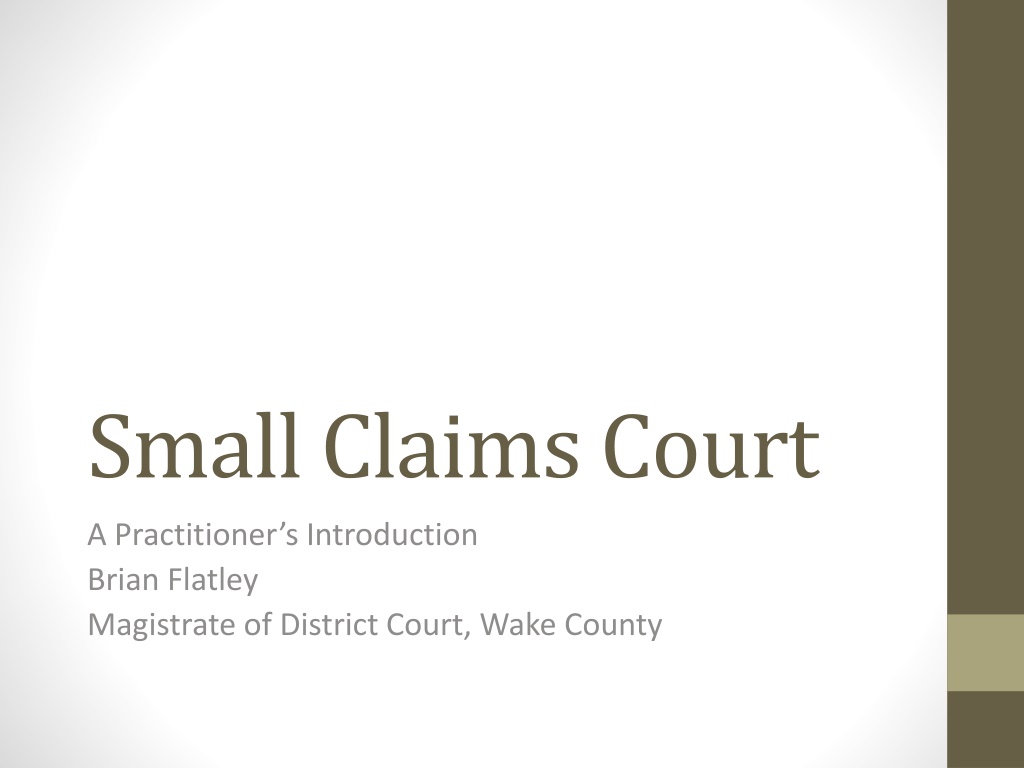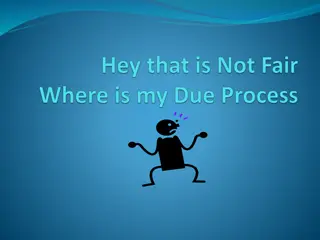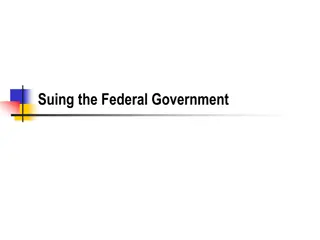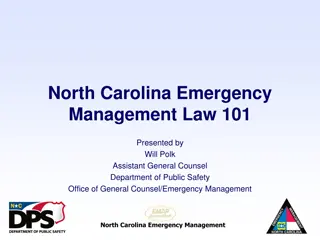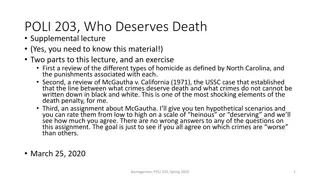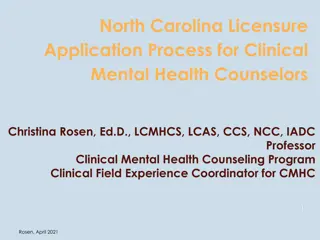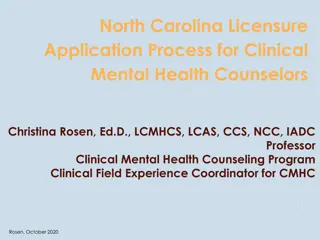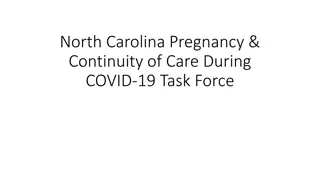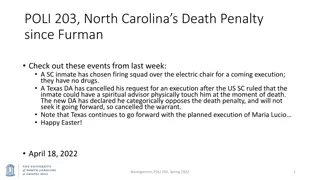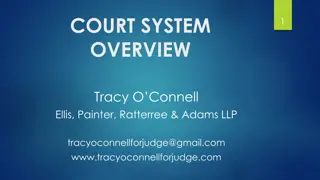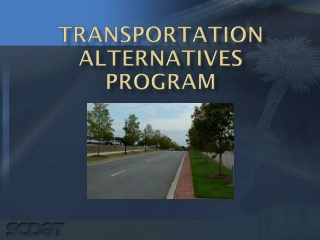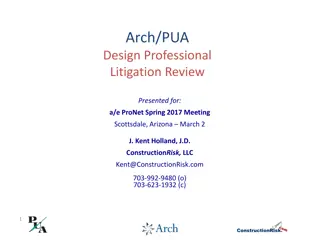Understanding Small Claims Court in North Carolina
Small Claims Court in North Carolina is a court of limited jurisdiction suited for matters involving modest amounts of money. This court welcomes attorneys, making it accessible for individuals seeking resolution. The maximum amount one can claim is $5000, with specific exceptions. Cases must be filed in the county where the defendant resides.
Download Presentation

Please find below an Image/Link to download the presentation.
The content on the website is provided AS IS for your information and personal use only. It may not be sold, licensed, or shared on other websites without obtaining consent from the author. Download presentation by click this link. If you encounter any issues during the download, it is possible that the publisher has removed the file from their server.
E N D
Presentation Transcript
Small Claims Court A Practitioner s Introduction Brian Flatley Magistrate of District Court, Wake County
Thus, when you go with your accuser before a magistrate, on the way make an effort to settle the case, or you may be dragged before the judge, and the judge hand you over to the officer, and the officer throw you in prison. I tell you, you will never get out until you have paid the very last penny. Luke 12:58-59 2
What is Small Claims Court? Small Claims Court is a court of limited jurisdiction, designed to meet the needs of ordinary citizens in matters involving relatively small amounts of money. Unlike other states, North Carolina welcomes attorneys in Small Claims Court. The great majority of civil claims in North Carolina go through Small Claims; 23,000 a year in Wake County alone. 3
Attorneys are Welcome Here Attorneys once were rarely found in Small Claims Court. Now, it s rare to have a day without attorneys. Why is this? If you can do Superior Court, you can do Small Claims. Don t know how to do something? Just ask the Magistrate. 4
Anything Under $5000 Not quite. Small Claims is the proper court when relief sought is money, return of property, or summary ejectment. See N.C.G.S. 7A-210. Important exceptions: specific performance, declaratory judgments, domestic cases. 5
G.S. 7A-243(1) provides that the amount in controversy in Small Claims Court shall not exceed $5000, exclusive of interest and costs. Interest means post-judgment interest. Splitting of claims is not allowed. Counterclaims of greater than $5000 not allowed per G.S. 7A-219. 6
Case must be filed in the County where one of the Defendants resides. In the case of a corporation, can be the County where registered agent is located, or where principal office is located. See N.C.G.S. 7A-211. Defendant must be bona fide resident of County. He works there is not enough. Exception: Motor Vehicle Lien. This must be filed in the County where the lien arose, regardless of whether Defendant resides there. 7
Splitting claims: When Plaintiff attempts to fit an $8000 claim into $5000 Small Claims Court. Sometimes this is permissible, for example when a contractor works for a builder on several different houses. Critical point is whether the houses were under one contract or several separate contracts. Obligation under one contract cannot be broken up into segments to squeak into Small Claims. 8
Service of Process It s the same as in other courts, except it s different. See N.C.G.S. 7A-217. Service by publication generally not acceptable in Small Claims, except in Motor Vehicle Lien cases. In Landlord-Tenant cases, service by posting is acceptable. This means attaching complaint and summons to door of Defendant s residence. See N.C.G.S. 42-29. 9
Methods of Service Service by Sheriff: personal, or leaving copy at residence with a person. Certified Mail Service. Posting: Ejectment cases only, at the discretion of the Sheriff. N.C.G.S. 42-29. Defendant may subject himself to jurisdiction of the court, either by personal appearance, or by signing a written acceptance of jurisdiction, or by filing an answer or counterclaim. 10
Time of Trial Trial must be set not later than 30 days after action commenced. N.C.G.S. 7A-214. Trial must be at least five days after service of summons. Weekends and holidays are included in calculation. Magistrate shall order a continuance if not served timely. Ejectment cases excepted from this requirement. 11
Continuances By consent of all parties the time for trial may be changed from the time set. N.C.G.S. 7A-214 There is no TCA in Small Claims. You must call the Magistrate in order to get your court date moved, or come to court. Opposing party must be involved in this decision. This usually means YOU must contact opposing party. New court date will result from negotiation between parties and magistrate. 12
Objections to Personal Jurisdiction 7A-221. Objections to venue and jurisdiction over person. By motion prior to filing answer, or in the answer, the defendant may object that the venue is improper, or move for change of venue, or object to the jurisdiction of the court over his person. These motions or objections are heard on notice by the chief district judge or a district judge designated by order or rule of the chief district judge. Assignment to the magistrate is suspended pending determination of the objection, and the clerk gives notice of the suspension by any convenient means to the magistrate to whom the action has been assigned. All these objections are waived if not made prior to the date set for trial. If venue is determined to be improper, or is ordered changed, the action is transferred to the district court of the new venue, and is not thereafter assigned to a magistrate, but proceeds as in the case of civil actions generally. (1965, c. 310, s. 1.) 13
Trial Practice N.C.G.S. 7A-222 says the rules of evidence generally are observed in Small Claims Court. What the heck does that mean? It depends on where you practice. Some magistrates are very formalistic, others much less so. All magistrates are motivated by a desire to uphold the law and serve the cause of justice. This sometimes means allowing pro se plaintiffs and defendants to bring forth evidence that would be excluded in other tribunals. 14
The first rule in every Small Claims Court: be nice. Show deference and respect toward the Court, your opponent and witnesses. Resist the temptation to tee off on your opponent. Remember, these cases are important to the litigants. 15
Things Are Different Here Expect to see things in Small Claims you won t see in other Courts. Individuals representing themselves are frequently very emotional. For a lot of litigants, a Small Claims case is more about feelings than about money or legal rights. Photographs and records aren t what you think they are in this Court. No bailiff. So, again, be nice. 16
The Complaint N.C.G.S. 7A-216 states it need be in no particular form. Form CVM-200 usually is used. Want to submit a formal complaint? No problem. No discovery in Small Claims; however, subpoenas can and should be used. See N.C.G.S. 7A-231. 17
The Answer No Default Judgments in Small Claims, therefore, an answer is not strictly necessary. An absence of an answer is deemed a general denial in Small Claims. Answers are helpful; can help magistrate to frame issues before trial. 18
Show Me the Write-Up! Things are more informal here, which can work to your advantage! Litigants often hand me written summaries of their cases. I call these write-ups. Use your writing abilities to create one of your own. Your opponent will better understand your position, and I will too. This can save a lot of time, and narrows the issues for the Court. 19
Dont Object to Everything Your opponent is quite likely to be pro se, and likely not to have a clue about procedure. Object to everything, and you may impress your client. You won t impress the magistrate. Failing to prepare will prepare you for failure. 20
Landlord and Tenant Summary Ejectment is the process by which a landlord dispossesses a tenant for violations of a lease. Trial date must be set within seven business days after issuance of summons. Usually this means a ten-day time frame. Any Summary Ejectment action can be commenced in Small Claims, but limit for back rent and other damages is still $5000. An attorney can work around this limitation by seeking possession only in an Ejectment action, and seeking money damages in a later action. 21
Lease Violations and the Defense of Tender In an oral lease, the landlord must observe a ten-day waiting period before proceeding against a tenant for non-payment of rent. Tenant has the defense of tender, which allows tenant to pay full amount of arrears into court before judgment. N.C.G.S. 42-33 In most written leases, nonpayment of rent is specified as a violation of lease for which ejectment is indicated. The ten-day waiting period does not apply under these circumstances. As a practical matter, this means that tender usually is not a defense for the tenant in cases involving written leases. 22
If you represent a landlord, make sure your client knows not to take rent after filing for ejectment. Even a small payment may bar landlord from possession. If landlord gets a check from tenant, send it back immediately. Holding the check is the same thing as accepting it. Landlord has a duty to mitigate damages. In ejectment actions, rent awarded is pro-rated up to the date of trial. For this reason, and because property damage may be unknown, some attorneys prefer to ask for possession only at trial. 23
The Obligation to Pay Rent N.C.G.S. 42-44(c) says that a tenant may not unilaterally withhold rent prior to a judicial determination of a right to do so. BUT, N.C.G.S 42-41 says The tenant's obligation to pay rent under the rental agreement or assignment and to comply with G.S. 42-43 and the landlord's obligation to comply with G.S. 42-42(a) shall be mutually dependent. What does this mean? 24
Three Basic Approaches For a tenant experiencing difficulties due to defects in the dwelling: 1. Pay rent, stay on and sue the landlord. 2. Leave, pay rent through date of exit, and sue the landlord. 3. Stay on, don t pay rent, and wait for the landlord to sue you. 25
Security Deposits 42-51. Permitted uses of the deposit. Security deposits for residential dwelling units shall be permitted only for the tenant's possible nonpayment of rent and costs for water or sewer services provided pursuant to G.S. 62-110(g), damage to the premises, nonfulfillment of rental period, any unpaid bills that become a lien against the demised property due to the tenant's occupancy, costs of re-renting the premises after breach by the tenant, costs of removal and storage of tenant's property after a summary ejectment proceeding or court costs in connection with terminating a tenancy. The security deposit shall not exceed an amount equal to two weeks' rent if a tenancy is week to week, one and one-half months' rent if a tenancy is month to month, and two months' rent for terms greater than month to month. These deposits must be fully accounted for by the landlord as set forth in G.S. 42-52. (1977, c. 914, s. 1; 1983, c. 672, s. 3; 2001-502, s. 5; 2004-143, s. 6.) 26
Security deposit cannot be retained in whole or in part for purposes not enumerated in statute. Accounting must be in writing and sent to tenant within 30 days of end of tenancy. Deposit must be placed into a trust account at the start of the tenancy. N.C.G.S. 42-50 27
Contesting a Motor Vehicle Lien A handy remedy for a vehicle owner when a mechanic holds a car for lien. Use form AOC- CVM-900M. Allows owner to pay amount claimed for lien or amount owner says is actually owed for lien into Court, and Clerk issues an order awarding immediate possession of vehicle to owner. Subsequently, a hearing takes place before the magistrate to determine the proper amount of lien. Judgment is paid out of funds in possession of Clerk. See N.C.G.S. 44A-4(a). 28
The Effect of a Judgment Devastating to the credit of Judgment Debtor. Appeals go from Small Claims to District Court de novo; thence to Court of Appeals. See N.C.G.S. 7A-228. In ejectment cases, appeal bond is the uncontested amount of rent owed up to date of trial. See N.C.G.S. 42-34. 29
Are You In or Out? Be careful about what you say to small claims litigants you don t represent. If you are not going to represent a party, make sure this is well understood. Small Claims litigants are often somewhat unsophisticated, and hear what they want to. Use care when giving advice. 30
How Attorneys Make Small Claims Better Attorneys bring the best attributes of the lawyer s m tier to Small Claims: Discretion Professional Courtesy Detachment Organization Skill 31
Resources Forms on the internet: http://www.nccourts.org/Forms/FormSearch.asp Books on Small Claims: www.sog.unc.edu General Statutes Online: http://www.ncga.state.nc.us/gascripts/Statutes/StatutesTOC.p l 32
